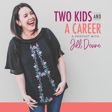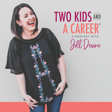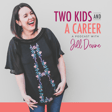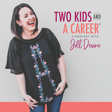
130: Ways To Declutter Your Mind
There have been many episodes of Two Kids and A Career dedicated to helping children with learning disabilities and/or ADHD. On the other hand, there hasn’t been a full episode dedicated to helping adults with learning disabilities and/or ADHD. That all changes with this week’s guest, Alex Gilbert. Here’s a little bit about Alex:
I'm a new mom, a New Yorker, a Mets fan, a yogi, and a brunch enthusiast. I also have dyslexia and ADHD.
After spending my career working in leadership development, I decided to start a consulting and coaching business that will help adults (like myself) with learning disabilities and/or ADHD who have been struggling in their day-to-day life and careers. My business, Cape-Able Consulting, was created to help them navigate their day-to-day workloads and life to feel supported to reach their highest potential.
In this week’s episode, Jill Devine and Alex discussed Alex’s misdiagnosis as a child and how that has fueled her to become the woman she is today. In addition, Alex offers free 1:1 30-minute “brain dumps” where she can discuss personal recommendations to implement organizational/focusing tips that match your style of learning.
IG: https://www.instagram.com/iamcapeable/?hl=en
TikTok: https://www.tiktok.com/@iamcapeable
LinkedIn: https://www.linkedin.com/in/alexandra-gilbert-ceo/
Two Kids and A Career Website: https://www.jilldevine.com/
Two Kids and A Career Instagram: https://www.instagram.com/jilldevine/?hl=en
Two Kids and A Career Facebook: https://www.facebook.com/JillDevineMedia/
Thank you to our sponsor: Evoke Creative



